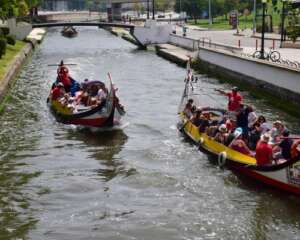Teach English in Portugal and you’ll get to call one of Europe’s most sun-kissed, wave-washed, beach-fringed countries home. Yep, this laid-back nation on the very tip of the Iberian Peninsula can be a darn fantastic place to move to. It might not be quite as famous as other European TEFL hotspots – France, Czechia – but that’s actually part of the charm, with friendly and welcoming local and expat communities ready and waiting in key teaching areas like Porto and Lisbon.
But it’s not just the glimmering sands of the Algarve beaches and the cobbled alleys of the historic capital that make this a doozy of a destination. The country is also in the midst of an economic revival, and there’s a huge tourist industry to boot. It’s even being touted as the next big digital nomad hub, so move over Chiang Mai. The result? There’s a constant and growing demand for high-quality English tuition, along with increasing quality of life.
These are just some of the reasons that we’ve put together this 101 for anyone looking to teach English in Portugal. It will outline the sort of jobs you can bag between the surf-washed beaches of the Silver Coast and Lisbon’s café-covered plazas. And it offers tips on how to start applying and what qualifications you’ll need.
What's in this guide?

The TEFL jobs market in Portugal
Despite a pretty hard economic downturn between 2008 and 2014, Portugal is now emerging as one of the burgeoning economies of Western Europe. Not only has there been steady growth of 1-3% year on year, but the country is now championed as a start-up mecca. Tech companies and creative industries have boomed, while Portugal is being whispered about as the next digital nomad haven. Things are looking up.
Even without all that, English language learning has always been a big part of Portuguese society. A whopping 19% of the GDP here is down to travel and tourism, and catering to UK and US visitors is one huge segment. The sector is growing, too, at a rate of almost 10% each year, so we think that the need to speak other lingos is only set to skyrocket.
The stats back it up: An estimated 95% of Portuguese school kids are now learning English as a second language, while 32% of the greater population speak English in some shape or form. The upshot? This might not be a MASSIVE market a la Germany or France, but there should still be plenty of opportunity for those who want to teach English in Portugal.
- Population: 28 million
- Language(s): Portuguese
- Currency: Euro (EUR, €)
- Capital city: Lisbon
- Estimated salary: €700-€1,200 ($850-$1455)/month
Types of TEFL jobs in Portugal
While there is some demand for English teachers in Portugal’s state school system, the reality is that those positions usually go to Portuguese-qualified graduates. It’s much more likely that you’ll be chasing one of the following types of position:

- Private language school – The most common type of teaching contracts in Portugal come from private institutions. These offer lessons outside of normal school/work hours to help younger learners and adults achieve their language goals in English.
- Business English school – With more and more tech and creative start-ups hitting Portugal every year, this sort of teaching is fast becoming big business. You’ll be teaching adults, usually during business hours.
- Private tutor – There are TEFL teachers in Portugal who make a living from one-on-one tutoring, however it’s more likely to be a supplement to another teaching contract.
- Online English teaching – We’ve already mentioned how Portugal is establishing itself as the next digital nomad hub. Come here to teach online and you’ll enjoy a low cost of living, great short-term rental prospects, and all the surf beaches you can handle.
TEFL teacher salary in Portugal
We’ll be honest – the salary expectations when you teach English in Portugal aren’t as good as in Spain, Germany, France, or even Italy. But you have to bear in mind that the GDP per capita here isn’t the same as those more developed Western European countries. In fact, ‘Western European’ is a little bit of a misnomer for Portugal. Economically, the country is more in line with Eastern European and Central European states like the Czech Republic or Slovakia.
The average salary range for new teachers in Portugal is between €700-€1,200 ($850-$1455)/month. That’s for a full-time contract of 22-25 hours each week. There’s preparation and marking time on top of that to schedule in, but you should have time left to supplement your income with private tutoring (per-hour rates for that are between $12-20/hour).
Visas for teaching in Portugal
There’s little to worry about on the visa front if you’re already an EU citizen. Just rock up, apply for your jobs, settle in, and start teaching. Just be sure you fill out the right documentation for residency, which you have to do within three months of arriving. It can be done at any municipal office (ask for the Cartão de Residencia form).
International passport holders should be ready to wade through lots of bureaucracy – hey, that’s just Portugal for ya’! You’ll need a Autorização de Trabalho (a working permit) and a long-term residency visa from the immigration office. Note that this cannot be completed without the sponsorship of an employer, so you’ll need to secure your job before you start the process of application.

Requirements to teach English in Portugal
The basic requirements to teach English in Portugal are:
- Native-level English (obviously!)
- A TEFL course – Go for at least a 120-hour TEFL course as it’s the basic one that’s asked for by most Portuguese schools.
Things that will help you get a job as an English teacher in Portugal.
- Be a native speaker – Private schools will often prioritize teachers who speak English as their mother tongue. You might also find it’s easier to secure one-on-one students as a tutor if you’re fully native.
- A BA/BSc degree – You can teach in Portugal without a degree but it will be harder to secure the best jobs, or even any job at all. You can apply for volunteer positions if you don’t have a degree, and summer camps are usually okay, too.
- Previous teaching experience – We often find that Portuguese schools prioritize previous experience a lot more than schools elsewhere in Europe. If you’ve taught before, be sure to mention it and mention it again at the interview stage!
- Portuguese language skills – Having a grasp of the local language can help with the application process as private schools think you might be better at communicating with parents and clients.
Term times and working hours in Portugal
The school year officially starts in early September (usually around the 12th) and ends in early June (sometime around the 9th). After that, it just gets too hot to do any work and it’s time to hit the beaches! Of course, you don’t HAVE to work in line with the school terms if you’re employed at a private language institution, though most of your classes are likely to have a hiatus in June, July, and August while everyone chills. If you’re keen to keep going throughout the summer, there are great TEFL summer camp opportunities in Portugal.
Most private school contracts will ask for between 20-30 contact hours per week. We say contact hours because those are the ones you’ll be paid for. Things like lesson planning and report writing aren’t included in your paycheck.
Cost of living in Portugal
Here’s the good news: Portugal is nowhere near as expensive as its Western European compadres. In fact, prices here – so long as you steer clear of the full-on tourist resorts of the Algarve – are more in line with those over in Poland and Slovakia. A rough estimation is that a single person will spend between €400-€550/month here, not including rent. That’s pretty good when you consider the average wage is about €1,000.
Some day-to-day cost estimations are below:
- Portuguese beer in a bar – €1 ($1.20)
- Decent bottle of wine – €5-7 ($6-8.50)
- One liter of milk from the grocery store – €0.65 ($0.79)
Where to teach English in Portugal?
It’s not often that you have to give reasons to go and visit Portugal. This isn’t one of the top vacation destinations in Europe for nothing! Its cities are stunning masses of tile-fronted churches, Baroque palazzos, café-filled squares, and haunting Moorish castles. The backcountry is dashed with olive forests and woodlands. Its coast – and here’s the real draw – is shimmering golden sands, breathtaking bays hemmed in by cliffs, and wild surf spots lashed by the full power of the Atlantic. Awesome stuff.
Lisbon
Most people who teach English in Portugal will head straight to Lisbon. It’s not only the capital. It’s also the most happening, most hedonistic, most international of all the towns in the country. TEFL jobs should pay a bit more here, and there are lots of opportunities. Lisbon – especially areas like Santos and Baixa – has also become a haven for digital nomads who teach English online to make a living. The city is a mass of cafes, cool churches, lookout points, and beer bars. We love it.

Porto
There’s a more mysterious energy to Porto, Portugal’s second city in the cooler (climactically speaking) north. Nestled on the banks of the Duoro River, it’s known for its rich red wines and port cellars (hence the name). You don’t have to drink to enjoy the place, though. The center is a UNESCO World Heritage Site maze of wiggling alleys and crooked houses that photographers go wild for. Then you get the beaches, which run from surfer-fav Matosinhos to the long and sandy Silver Coast further south.

Aviero
They call Aveiro the Venice of Portugal. It’s criss-crossed by lovely canals and waterways, on which quaint little boats known as Moliceiro transport the locals and travelers to and from the seafood markets and the bars. Aveiro is small and charming, with a more laid-back vibe than cities like Lisbon and Porto.

The Algarve
If you’re lucky enough to land a TEFL job in the Algarve, then give yourself a big pat on the back. People dream of living in this part of Portugal. For starters, the climate is fantastic. There are 300+ days of sun and the temperature rarely dips too low. Second, the beaches are among the most fantastic in the world – yep, the world! From the sparkling white sands that line the Ria Formosa to the wild Atlantic bays of Arrifana, there’s oodles to pick from.

Coimbra
Coimbra is draped elegantly over a hillside in the Centro region of Portugal. It’s slowly becoming a favorite with international expats because it’s a touch more relaxed than the big cities. It’s also one serious looker, with white-painted palaces dating back 500 years crowning the top of the city above the zig-zagging Mondego River. Come here to live a more local life and enjoy the slow pace that Portugal is known for.

Teach English in Portugal: Where to begin?
Tempted to teach English in Portugal? We can help you get started. Here’s a step-by-step guide:
- Get TEFL qualified: We’d recommend at least a 120-hour TEFL course That’s what most schools in Portugal and Europe generally will ask for when you apply.
- Go to Portugal: It’s much easier to score a job when you’re on the ground in Portugal. Places will often move fast from the interview stage to hiring. The best time to arrive to start applying for jobs is midsummer or around Christmas.
